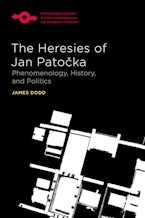A nuanced reflection on the meaning and resonance of Patočka’s philosophy
Foregrounding the turbulent political and intellectual scene in Czechoslovakia following the Prague Spring in 1968, James Dodd explores the unity of philosophy, history, and politics in Jan Patočka’s life and legacy. Dodd presents Patočka as an essential philosopher of modern concepts—such as freedom, subjectivity, and history—and also as an interpreter of prominent thinkers such as Husserl and Heidegger.
Dodd outlines the phenomenology that Patočka, as a late pupil of Husserl and Heidegger, crafted in response to the classical model before turning to his philosophy of history, which was oriented around the problem of Europe and the care for the soul. Finally, Dodd examines Patočka’s role as a dissident intellectual and one of the principal voices of the Charter 77 human rights movement until his death in March 1977. By situating Patočka’s thought in relation to classical phenomenology and to the political and historical conditions of Central Europe, Dodd illuminates the enduring impact of this key thinker of the twentieth century.
Preface
Introduction: Philosophy in Troubled Times
Chapter One: On an Asubjective Phenomenology
Chapter Two: On the Body
Chapter Three: On the Three Movements of Human Existence
Chapter Four: On Care for the Soul
Chapter Five: On Sacrifice
Chapter Six: On Hope
Chapter Seven: On Dissidence
Conclusion: Legacies
Epilogue
Notes
Index

